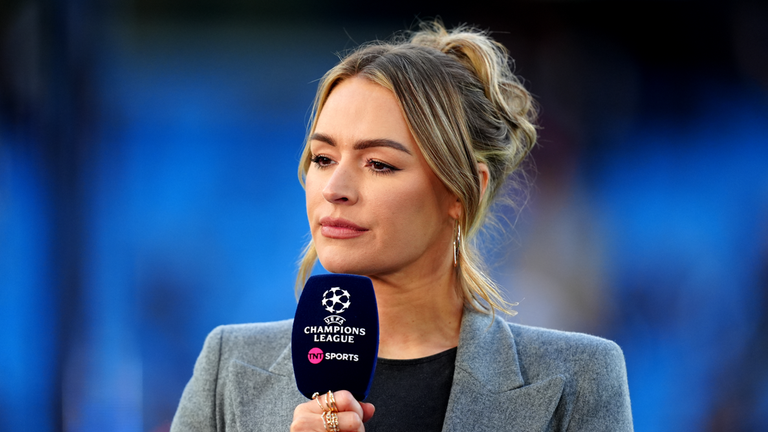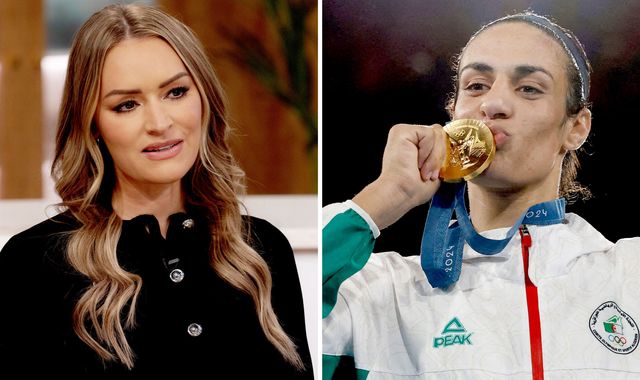TV Presenter Laura Woods Faces Death Threats After Commenting on Controversial Boxing Eligibility
3 min read

Laura Woods, a prominent TV presenter, has disclosed that she received “numerous death threats” online following her commentary on a contentious issue regarding the eligibility of Olympic boxing champions Imane Khelif and Lin Yu-ting.
Khelif, from Algeria, and Lin, from Chinese Taipei, both clinched gold medals in their respective weight classes at the Paris 2024 Olympics. Their victories came amid a heated public debate over their eligibility to compete in the women’s division. This controversy was exacerbated by their disqualification from last year’s World Championships, where they were reportedly barred after failing gender eligibility tests.
The disqualifications were imposed by the Russian-led International Boxing Association (IBA), which cited their failure to meet the organization’s criteria for female competitors. Despite this, the International Olympic Committee (IOC) cleared both athletes to compete in the Paris Games, leading to their eventual gold medal wins. The IOC’s decision was influenced by its criticism of the IBA’s testing protocols, with IOC President Thomas Bach acknowledging the lack of a scientifically reliable method to definitively distinguish between genders.
Woods, who is a well-known football presenter for TNT Sport and was involved in ITV Sport’s coverage of Euro 2024, commented on the situation through a social media post. She praised an article by Telegraph journalist Oliver Brown, which discussed the eligibility debate. Woods’s endorsement of the article triggered a torrent of online hostility, resulting in a barrage of threatening messages.
In a post on X (formerly Twitter), Woods revealed the severity of the backlash she faced. “Since I replied to this article, I’ve received numerous death threats aimed at myself and my unborn child,” Woods shared. She expressed her frustration over the threats and personal attacks, which included inquiries about her gender—an issue she noted was irrelevant given her pregnancy—and calls for her termination from her broadcasting roles.
Woods defended her position, emphasizing that questioning the legitimacy of eligibility tests is a reasonable response when discrepancies could potentially impact safety in sports. “When there are discrepancies with test results— which could impact the safety of another human being in an environment that should be fair—questions are quite rightly going to be asked,” she stated. “The answers are still unclear; otherwise, this topic would be closed.”
The IBA’s decision to disqualify Khelif and Lin had been based on their failure to meet specific eligibility standards, which the organization asserted were in line with its regulations. However, the IOC’s intervention and subsequent approval for the athletes to compete sparked further controversy, with some questioning the fairness and accuracy of the eligibility assessments.
 Khelif, who had already expressed frustration over the IBA’s decision, claimed she was subjected to “bullying” and criticized the IBA’s stance. She also revealed that she has initiated legal action against alleged cyberbullying, which reportedly includes claims against notable figures such as author J.K. Rowling and X owner Elon Musk. The lawsuit, filed following her Olympic success, underscores the intense scrutiny and personal attacks faced by athletes involved in high-profile controversies.
Khelif, who had already expressed frustration over the IBA’s decision, claimed she was subjected to “bullying” and criticized the IBA’s stance. She also revealed that she has initiated legal action against alleged cyberbullying, which reportedly includes claims against notable figures such as author J.K. Rowling and X owner Elon Musk. The lawsuit, filed following her Olympic success, underscores the intense scrutiny and personal attacks faced by athletes involved in high-profile controversies.
The ongoing debate highlights the complex and often contentious issues surrounding gender eligibility in sports. Despite the IOC’s attempt to resolve the matter, the lack of a universally accepted system for determining eligibility continues to provoke strong reactions and, unfortunately, threats of violence towards those who engage in the discussion.
The broader implications of this situation reflect the challenges faced by sports organizations in balancing fairness, scientific accuracy, and inclusivity while navigating the diverse opinions and concerns of the global public.